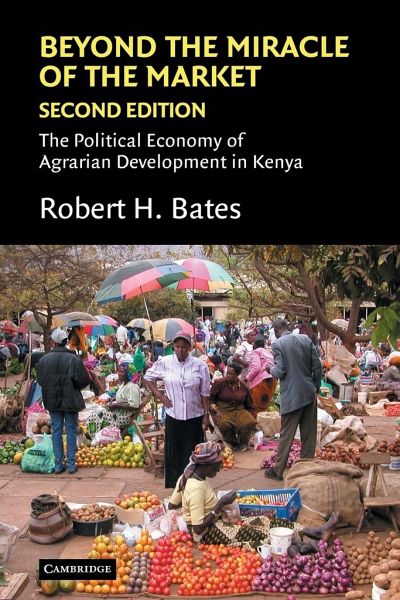
Beyond the Miracle of the Market
The Political Economy of Agrarian Development in Kenya

PAYBACK Punkte
18 °P sammeln!
Short description/annotationIt focuses on Kenya, a country that continued to grow while others declined in Africa.Main descriptionAs capitalism defeated socialism in Eastern Europe, the market displaced the state in the developing world. In Beyond the Miracle of the Market, Bates focuses on Kenya, a country that continued to grow while others declined in Africa, and mounts a prescient critique of the neo-classical turn in development economics. Attributing Kenya's exceptionalism to its economic institutions, this book pioneers the use of 'new institutionalism' in the field of development. In d...
Short description/annotation
It focuses on Kenya, a country that continued to grow while others declined in Africa.
Main description
As capitalism defeated socialism in Eastern Europe, the market displaced the state in the developing world. In Beyond the Miracle of the Market, Bates focuses on Kenya, a country that continued to grow while others declined in Africa, and mounts a prescient critique of the neo-classical turn in development economics. Attributing Kenya's exceptionalism to its economic institutions, this book pioneers the use of 'new institutionalism' in the field of development. In doing so, however, the author accuses the approach of being apolitical. Institutions introduce power into economic life. To account for their impact, economic analysis must therefore be complemented by political analysis; micro-economics must be imbedded in political science. In making this argument, Bates relates Kenya's subsequent economic decline to the change from the Kenyatta to the Moi regime and the subsequent use of the power of economic institutions to redistribute rather than to create wealth.
Table of contents:
1. The demand for revolution: the agrarian origins of Mau Mau; Appendix 1A. Kinship and stratification; 2. Material interest and political preference: the agrarian origins of political conflict; 3. Institutional structure, agricultural development, and political conflict; 4. From drought to famine: the dynamics of subsistence crises; Appendix 4A. The buying center program; 5. The politics of food crises; Appendix 5A. Famine: Meru, August 1984.
It focuses on Kenya, a country that continued to grow while others declined in Africa.
Main description
As capitalism defeated socialism in Eastern Europe, the market displaced the state in the developing world. In Beyond the Miracle of the Market, Bates focuses on Kenya, a country that continued to grow while others declined in Africa, and mounts a prescient critique of the neo-classical turn in development economics. Attributing Kenya's exceptionalism to its economic institutions, this book pioneers the use of 'new institutionalism' in the field of development. In doing so, however, the author accuses the approach of being apolitical. Institutions introduce power into economic life. To account for their impact, economic analysis must therefore be complemented by political analysis; micro-economics must be imbedded in political science. In making this argument, Bates relates Kenya's subsequent economic decline to the change from the Kenyatta to the Moi regime and the subsequent use of the power of economic institutions to redistribute rather than to create wealth.
Table of contents:
1. The demand for revolution: the agrarian origins of Mau Mau; Appendix 1A. Kinship and stratification; 2. Material interest and political preference: the agrarian origins of political conflict; 3. Institutional structure, agricultural development, and political conflict; 4. From drought to famine: the dynamics of subsistence crises; Appendix 4A. The buying center program; 5. The politics of food crises; Appendix 5A. Famine: Meru, August 1984.




